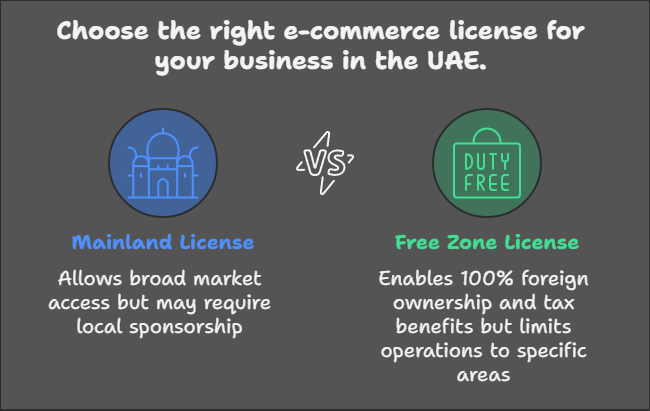Introduction
Starting your e-commerce business in the UAE is an exciting venture. It opens doors to a vibrant market filled with opportunities. So, if you’re selling handmade crafts, digital products, or anything in between, then having the right e-commerce license is essential for you.
As without having a proper e-commerce license, you can’t operate legally and successfully. The good news? The process is more straightforward than you think. It is designed simply to support freelancers and entrepreneurs like you!
This blog is written to walk you through the steps. The whole process to obtain your e-commerce license in the UAE. We ensure that you’re equipped with all the information you need before stepping forward. Let’s dive in and turn your business dreams into reality! And learn how to get e commerce license in UAE.
The Growing E-Commerce Market in the UAE:
The e-commerce market in the UAE is growing rapidly. It has at its helm a technologically advanced population. This in itself is increasing consumer demand for online shopping. Businesses can reach those customers across the region more easily than before. Projections show this is still only the beginning of growth for the e-commerce sector. So it’s the right time for entrepreneurs and freelancers to tap into this vibrant market.
This growth offers extensive opportunities for freelancers. The ones looking to establish their online stores or services. Connecting with a wider audience is immense. Whether you’re an artist selling unique creations or a consultant offering digital products. Additionally, freelancers can position themselves for success. This can be done by leveraging the UAE’s favorable business environment.
Why Freelancers Need an E-Commerce License:
Obtaining an e-commerce license is essential for freelancers. This helps in legal compliance and protects their business interests. Operating an online business can lead to potential legal issues and fines Without this license. It can impact your entrepreneurial journey. Licensing legitimizes your business. But, it also enhances your credibility with customers and partners. This fosters trust and confidence in your brand.
Having an e-commerce license opens up various avenues for growth and expansion, enabling freelancers to access online payment gateways. They can also participate in local marketplaces. So, that they advertise their products or services more effectively.
Freelancers position themselves for long-term success by investing in an e-commerce license. This allows them to focus on creativity and innovation. While they navigate the exciting world of online commerce.
Are you the one looking to obtain your e-commerce license in UAE, then go through this article to explore how to get e commerce license in UAE.
Understanding E-Commerce Licenses in the UAE
E-commerce licenses are necessary to obtain. Particularly for anyone looking to operate an online business in the UAE. They provide the legal framework needed. It enables you to operate smoothly within the vibrant digital marketplace. Obtaining the right license type protects you legally. But, it also enhances your business credibility, this depends on the business nature.
Additionally, understanding the options available like how to get e commerce license in UAE and their specific requirements is essential. Especially for freelancers and entrepreneurs. The ones that aim to thrive in the UAE’s e-commerce sector.
Types of E-Commerce Licenses:
In the UAE, there are generally two main types of e-commerce licenses:
- Mainland licenses
- Free zone licenses
A mainland license allows you to operate anywhere in the UAE. You can engage directly with the local market. However, it may require a local sponsor.
On the other hand, a free zone license provides several benefits. This includes 100% foreign ownership and tax exemptions. It limits your business activities to the specific free zone area and certain online marketplaces. Selecting the right license depends on your business model, target market, and operational preferences.
Benefits of an E-Commerce License:
Having an e-commerce license comes with numerous advantages. Firstly, it ensures legal compliance and protects you from potential fines and legal issues. The issues that could arise from operating without proper authorization.
Furthermore, a licensed business enhances your credibility. It allows you to build trust with customers and partners. It is vital in the competitive online marketplace. An e-commerce license provides access to various resources and opportunities. This entails online payment gateways and marketing platforms, enabling you to reach a broader audience effectively.
Additionally, an e-commerce license also allows you to leverage local logistics and shipping solutions. This helps you in the timely delivery of your products. Lastly, an e-commerce license is not just a regulatory requirement; it’s a key investment in the success of your online business.
Preparing for the Application Process
Getting ready for the e-commerce license application process involves understanding the specific requirements and preparing your documentation. This step is crucial to ensure a smooth and efficient application experience. By being well-prepared, you can avoid delays and set a solid foundation for your online business.
Eligibility Requirements:
To qualify for an e-commerce license in the UAE, typically freelancers and entrepreneurs need to meet several key eligibility criteria. These may include:
- The individual must be at least 21 years old
- He/she must possess a valid UAE residence visa
- They must have a registered trade name.
- Applicants should demonstrate that their business activities align with the licensing category they are applying for.
Familiarizing yourself with these requirements early on will streamline the process. It helps you gather the necessary documentation.
Choosing the Right License Type:
The appropriate e-commerce license type selection is a crucial decision. It impacts how you operate your business. Choose between a mainland license and a free zone license. Want to engage directly with the local market and have a broader reach? Then, a mainland license may be the best fit.
Prefer 100% ownership and tax benefits? A free zone license might be more advantageous. Must assess your business goals, target audience, and operational needs carefully. This helps you determine which license type aligns best. Particularly with your vision for success in the UAE’s thriving e-commerce landscape!
Steps to Obtain an E-Commerce License
Obtaining an e-commerce license involves several important steps. We share a clear guide to help you go through the process smoothly:
Step 1: Choose Your Business Activity:
Start by defining your business activity. This could range from selling products to offering services online. Clearly outlining your business model will help determine the type of license you need.
Step 2: Select a Jurisdiction:
Decide and select where you want to establish your business. Choose between a mainland setup. It allows broader market access. However, the free zone offers benefits like 100% foreign ownership. The choice will affect various aspects of your business operations.
Step 3: Register Your Trade Name:
A unique trade name for your business reflects your brand. So, choose a trade name that complies with UAE regulations. Once selected, register the name with the relevant authorities. This ensures it is officially recognized.
Step 4: Apply for Initial Approval:
Submit an initial approval application to the relevant licensing authority. It verifies that your business idea aligns with local regulations. It also ensures that you meet the eligibility criteria.
Step 5: Prepare Required Documents:
Gather all necessary documents for your application. This typically includes:
- Your trade name certificate
- Passport copies
- A business plan, and
- Any additional documents specific to your chosen jurisdiction.
Step 6: Lease Office Space:
Secure a physical office space if required for your chosen license type. This can be a dedicated office or a co-working space. However, it depends on your business model and jurisdiction requirements.
Step 7: Submit Your Application:
Submit your complete application to the licensing authority. This can be done once you have all your documents ready. Make sure to double-check everything. This is to check accuracy and help avoid any delays.
Step 8: Pay the Fees:
Finally, pay the applicable licensing fees. The cost may vary based on your chosen jurisdiction. It is also dependent on the license type you are applying for. After payment, you’ll receive your e-commerce license. It allows you to start an online business legally in the UAE!
Following these steps will help you navigate the licensing process with ease. Start your success in the vibrant e-commerce landscape of the UAE.
Navigating Legal and Compliance Requirements
Legal and compliance requirements are, therefore important for any business undertaking within the UAE. Such would begin with an understanding of the several legal requirements governing business operations, which tend to vary widely between industries and the emirate in which a business operates.
Businesses must have robust compliance frameworks to comply with such laws, reduce the risks of legal action, and avoid penalties. This is typically realized through regular employee training, setting up routine compliance audits, and following changes in regulation.
Understanding Legal Obligations:
Legal obligations are, therefore, the most important aspects for companies that want to maintain integrity and reputation in the UAE. Companies need to be educated about their duties with regard to labor laws, data protection, intellectual property, and environmental regulation.
This embraces not only local laws but also how international regulations may infuse into local practices. Legal obligations involve bringing transparency into financial reporting and being agile to consumer protection laws that help a company gain the trust of its clients and partners.
Compliance with UAE Regulations:
For business success, UAE regulation compliance is critical. The UAE has a comprehensive regulatory framework. It includes federal laws as well as specific emirate-level regulations. Companies must navigate these intricacies. This ensures they meet requirements related to licensing, taxation, and employment.
Furthermore, sectors like finance, healthcare, and telecommunications. These sectors have additional regulatory bodies overseeing compliance. Businesses can avoid legal complications and foster a culture of integrity by prioritizing adherence to these regulations. It contributes to sustainable growth in the region.
The Role of PRO Services
PRO plays a vital role in helping businesses steer the legal and administrative landscape in the UAE. These services act as intermediaries. Especially between companies and government authorities. It facilitates various processes such as:
- Licensing
- Visa applications, and
- Document attestation.
PROs are essential for ensuring that all necessary paperwork is completed accurately. It also makes sure of timely submission. This helps businesses maintain compliance with local regulations. It saves valuable time and resources.
Why Use PRO Services?:
PRO services can significantly simplify the operation process of a company, more so when engaging companies that are unfamiliar with the legal environment of the UAE. They are well knowledge of the local laws and procedures and can easily go through various bureaucratic formalities in your favor.
The company, therefore, is able to focus on its main activities without the distraction of an involved legal obligation. PRO services help remove the risk of expensive errors or delays to ensure business runs in a smooth process, free from worry.
How KPMPRO Can Help:
KPMPRO specializes in PRO services for any type of business, customized according to the specific needs of the business in the UAE. KPMPRO’s personnel provide complete assistance from registration of companies to visa processing and all other legalizations of documents.
The experience of the personnel ensures obedience to all standards of the laws and regulations prevailing in the place while enjoying personalized treatment for customers.
KPMPRO has been established to simplify the process of the administration for business enterprises, free from jargon and legal terminologies, which thereby reduces risks while enhancing the performance of companies’ operations with the highest aim of letting them grow and work.
Setting Up Your E-Commerce Platform
Setting up your e-commerce store involves several steps. We are going to discuss each of them in detail:
Choosing an E-Commerce Platform:
It is the first step in choosing the right e-commerce platform for any online business. Factors like scalability, ease of use, and the features offered should guide this decision. However, popular platforms like Shopify, WooCommerce, and Magento. Each has its strengths. They cater to different business sizes and needs.
It is essential to evaluate the platform’s customization options. You need to check available plugins, and support services. Additionally, it is a must to see its ability to integrate with existing systems. A well-chosen platform can streamline operations. It enhances user experience and drives sales effectively.
Website Development and Design:
In the competitive e-commerce landscape, website development plays a crucial role. Particularly in attracting and retaining customers. A user-friendly interface, responsive design, and intuitive navigation are essential. This ensures a seamless shopping experience.
Effective branding elements can create a strong online identity. Additionally, incorporating SEO best practices during development also enhances visibility in search engine results. This drives organic traffic to the site. Investing in professional design and development can boost customer satisfaction and conversion rates.
Payment Gateway Integration:
Payment gateway integration is a vital component of any e-commerce platform. It facilitates secure online transactions. Choosing the right payment gateway involves considering factors like:
- Transaction fees
- Supported payment methods, and
- User experience.
Popular options such as PayPal, Stripe, and local gateways. They provide varying levels of security and convenience. A seamless integration process ensures that customers can complete purchases effortlessly. The robust security features protect sensitive information. Businesses can build trust with customers by prioritizing payment gateway integration. It ultimately enhances sales.
Marketing Your E-Commerce Business
Without marketing, no business can grow. This is equally important when to comes to your online e-commerce business. You need to build:
- Increase Online Presence
- Apply digital marketing strategies
- Utilize social media accounts
Building an Online Presence:
Building a strong online presence is fundamental for the success of any e-commerce business. This involves creating a professional website that reflects your brand identity and provides a user-friendly experience.
Additionally, implementing search engine optimization (SEO) techniques can enhance visibility in search engine results, driving organic traffic to your site.
Consistent branding across various platforms—such as your website, email marketing, and online advertisements—helps establish credibility and recognition. An effective online presence not only attracts customers but also fosters trust and loyalty over time.
Digital Marketing Strategies:
Digital marketing strategies are essential for reaching and engaging your target audience effectively. This can include various tactics such as email marketing, pay-per-click advertising, and content marketing.
Tailoring your approach to your audience’s preferences and behaviors is key; for instance, utilizing targeted ads can help attract potential customers who are actively searching for products like yours.
Analyzing metrics and performance data allows for continuous improvement of your marketing efforts, ensuring you stay aligned with market trends and consumer interests, ultimately driving sales and growth.
Utilizing Social Media:
Utilizing social media is a powerful way to connect with customers and promote your e-commerce business. Platforms like Instagram, Facebook, and TikTok offer unique opportunities to showcase products through engaging content, such as videos and high-quality images. Social media also facilitates direct interaction with customers, allowing businesses to respond to inquiries, gather feedback, and build community.
Running targeted advertising campaigns on these platforms can increase brand awareness and drive traffic to your website. By leveraging social media effectively, businesses can cultivate a loyal following and enhance their overall marketing strategy.
Managing and Growing Your E-Commerce Business
Managing and growing an e-commerce business is the most important phase. You have to maintain inventories, provide excellent customer service, and take your business to new heights. For instance, we have discussed how you can achieve it.
Inventory Management:
Effective inventory management is crucial for the success of any e-commerce business. It involves tracking stock levels, managing reorder points, and ensuring that products are available when customers want to purchase them.
Implementing inventory management software can automate these processes, providing real-time visibility into stock levels and helping to prevent overstocking or stockouts.
By optimizing inventory practices, businesses can reduce costs, improve cash flow, and enhance customer satisfaction through timely order fulfillment.
Customer Service Excellence:
Delivering exceptional customer service is key to building loyalty and driving repeat business in e-commerce. This involves providing prompt responses to inquiries, resolving issues efficiently, and creating a seamless shopping experience from browsing to post-purchase support.
Utilizing multiple communication channels, such as live chat, email, and social media, allows customers to reach out in their preferred way. Training staff to handle customer interactions professionally and empathetically can significantly enhance the customer experience, leading to positive reviews and referrals.
Scaling Your Business:
Scaling your e-commerce business requires strategic planning and execution. This can involve expanding your product range, entering new markets, or enhancing your marketing efforts to reach a broader audience. Leveraging data analytics helps identify growth opportunities and optimize operations for efficiency.
Additionally, investing in technology, such as automation tools and advanced analytics, can support scalability by streamlining processes and improving decision-making. By focusing on sustainable growth strategies, businesses can adapt to changing market conditions while maximizing their potential for success.
Conclusion
Obtaining an e-commerce license in the UAE is a crucial step for freelancers looking to establish a legitimate online business. By understanding the specific requirements, such as documentation, application procedures, and the importance of compliance with local regulations, freelancers can navigate the process more effectively.
The UAE offers a supportive environment for e-commerce, with various free zones and jurisdictions that cater to different business needs. With the right license in hand, freelancers can operate confidently, expand their market reach, and capitalize on the thriving e-commerce landscape, ultimately setting the foundation for long-term success.
We penned down this article to help you obtain your e-commerce license smoothly. Hope this article helps you how to get e commerce license in UAE! For more information, you can contact KPM PRO anytime.
FAQs:
What is an e-commerce license in the UAE for freelancers?
An e-commerce license allows freelancers to legally sell products or services online in the UAE through websites, social media, or online marketplaces. It enables individuals to operate a digital business without setting up a full company.
Can freelancers apply for an e-commerce license in the UAE?
Yes, freelancers can apply for an e-commerce license in the UAE through free zones, mainland authorities, or dedicated freelance permit programs, depending on their business activity and residency status.
Which authorities issue e-commerce licenses for freelance businesses in the UAE?
E-commerce licenses are issued by mainland authorities such as the Department of Economic Development (DED) and free zones like Dubai CommerCity, SHAMS, RAKEZ, and Ajman Free Zone.
What activities are allowed under a freelance e-commerce license?
Allowed activities typically include online retail, digital product sales, dropshipping, online marketing services, content creation, consulting, and selling through social media platforms.





